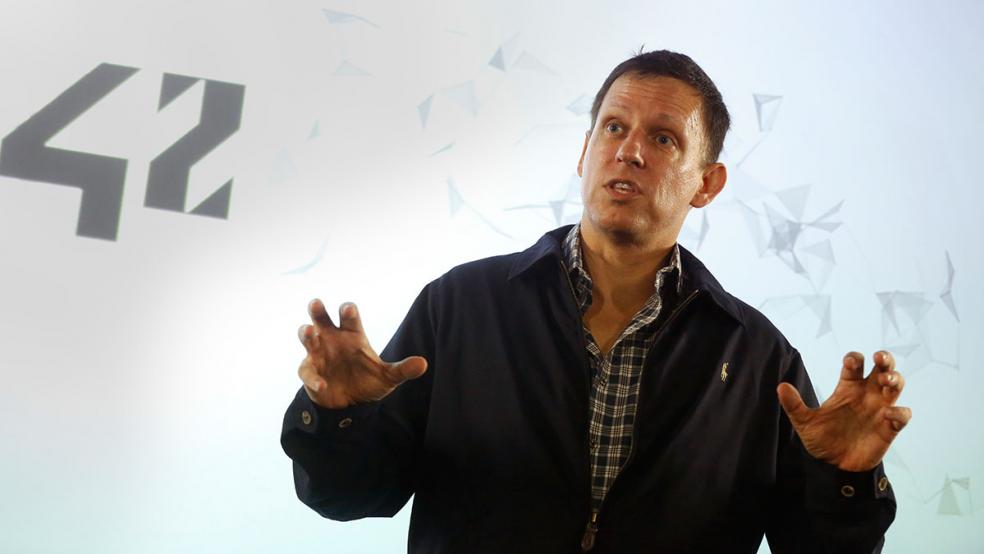Silicon Valley billionaire Peter Thiel likes to say that the problem with the news media is that it takes Republican presidential nominee Donald Trump “literally, but not seriously,” while he and other Trump supporters rightly take the New York businessman quite seriously but rarely literally.
Offering a vigorous defense of his speech at the Republican National Convention this summer endorsing the GOP nominee and his $1.25 million contribution following the release of the infamous, 11-year-old NBC Access Hollywood tape showing Trump boasting about groping women, Thiel said in a speech on Monday that Trump offers an authentic outsider’s voice that is needed to end the status quo in Washington.
Related: Silicon Valley Is Making Peter Thiel Pay for Supporting Trump
"Nobody thinks his comments about women were acceptable,” Thiel told a large gathering of the National Press Club. “I agree they were clearly offensive and inappropriate. But I don't think voters pull the lever in order to endorse a candidate's flaws.”
“It's not a lack of judgment that leads Americans to vote for Trump,” he added. “We're voting for Trump because we judge the leadership of our country to have failed."
Thiel is the co-founder of PayPal and a venture capitalist who secretly bankrolled wrestling star Hulk Hogan's lawsuit that financially destroyed the news website Gawker. His decision to back Trump has made him persona non grata among many of his wealthy peers in Silicon Valley and a target for accusations of promoting racism, misogyny and intolerance. There were even demands that Facebook kick him off its board of directors.
Thiel struggled in arguing today that it was a mistake to take Trump literally, when — for example — he calls for building a wall along the U.S-Mexico border, or deporting 11 million illegal immigrants, or temporarily barring Muslims from entering the country or tearing up all of the U.S. trade agreements and starting over. Thiel contends that “there is a lot of room” between Trump’s fiery pronouncements and actual policy discussions about how to tackle those issues.
Related: It Looks Like Investors Have a Clear Favorite in the Election
But not paying close attention to what Trump is saying specifically — and how his words might translate into government policy if he wins the presidential election — is a highly risky thing for anyone, including Thiel, to ask of voters. If a candidate’s pronouncements have little connection to the practical reality of how they would govern, then almost any idea can flourish when policy discussions finally take place. How are voters supposed to choose a president when his or her vague pronouncements could lead down virtually path? And what happens when some supporters inevitably do believe in the literal truth of the "fiery pronouncements" and are then disappointed?
Similarly, Thiel’s assertion that Trump had a better temperament than Hillary Clinton to be commander in chief and would be more likely to keep the U.S. out of future armed conflicts rang hollow. Thiel dismissed Clinton as a symbol of the status quo and someone so hawkish in her defense policies that she would be likely to draw the U.S. into a conflict with Russia with her calls for establishing a no-fly-zone in Syria to protect refugees. He also argued in his speech that Trump, the billionaire New York real estate businessman, "points toward a new Republican Party beyond the dogmas of Reaganism."
"He points even beyond the remaking of one party to a new American politics that overcomes denial, rejects bubble thinking and reckons with reality," Thiel said of trump. "When the distracting spectacles of this election season are forgotten and the history of our time is written, the only important question will be whether or not that new politics came too late."
Related: Clinton’s Coziness With Silicon Valley Is More Troubling Than Her Wall Street Ties
Thiel mused at the start of his speech that everyone knows we have been going through a “crazy campaign” that has been delicious fodder for NBC’s Saturday Night Live show. But he predicted the results of the campaign will last well beyond Nov. 8: “What Trump represents is not crazy and it’s not going away.”





